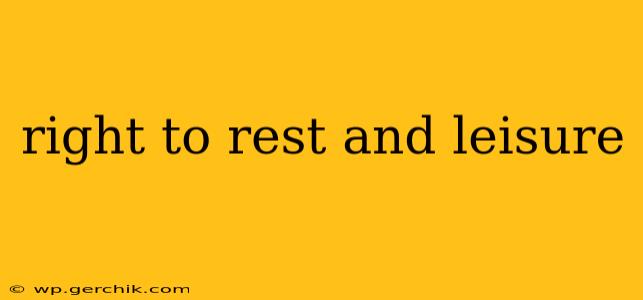The right to rest and leisure is often overlooked, yet it's a cornerstone of human dignity and well-being, intrinsically linked to other fundamental rights. This isn't just about taking a vacation; it's about the fundamental need for periods of relaxation, recreation, and personal fulfillment to maintain physical and mental health, fostering a balanced and productive life. This article delves into the significance of this crucial right, exploring its legal basis, practical implications, and the challenges in ensuring its universal realization.
What is the Right to Rest and Leisure?
The right to rest and leisure is enshrined in international human rights law, specifically Article 24 of the Universal Declaration of Human Rights (UDHR) and Article 7 of the International Covenant on Economic, Social and Cultural Rights (ICESCR). It's not simply the right to have leisure time; it encompasses the right to:
- Rest: This includes adequate periods of rest to recover from work and daily activities, preventing exhaustion and burnout. It's about having sufficient sleep, free from undue stress or interruptions.
- Leisure: This goes beyond simple rest; it’s about having time for activities that are personally fulfilling and enjoyable. This could include hobbies, spending time with loved ones, engaging in cultural activities, or simply relaxing and unwinding.
- Periodic Holidays with Pay: This ensures that individuals have the opportunity to take regular breaks from work, allowing them to recharge and maintain a healthy work-life balance. This aspect is particularly crucial for employees.
This right is interconnected with other fundamental rights, such as the right to work (with reasonable limitations), the right to health, and the right to an adequate standard of living. Without adequate rest and leisure, the enjoyment of these other rights is significantly impaired.
How is the Right to Rest and Leisure Protected?
The legal protection of the right to rest and leisure varies across countries. While the UDHR and ICESCR provide a strong international framework, their implementation depends on national legislation and policies. Many countries have laws related to working hours, paid leave, and public holidays, all aiming to protect this right. However, the effectiveness of these laws varies widely, often influenced by factors such as economic development, social norms, and enforcement mechanisms.
What are the Challenges in Ensuring the Right to Rest and Leisure?
Despite its legal recognition, realizing the right to rest and leisure remains a significant challenge globally:
- Long Working Hours and Overwork: In many parts of the world, long working hours, often exceeding legal limits, are commonplace, leaving individuals with little or no time for rest and leisure. The pressure to work longer hours for better pay or job security often overrides the importance of rest.
- Lack of Paid Leave: Many workers, particularly in informal sectors, lack access to paid leave, severely limiting their ability to take time off for rest and recreation.
- Poverty and Economic Inequality: Poverty severely restricts access to leisure activities, as individuals may lack the financial resources to engage in recreational pursuits or even afford basic necessities, leaving little room for anything beyond survival.
- Gender Inequality: Women often bear a disproportionate burden of unpaid care work, limiting their access to rest and leisure compared to men.
What is the Importance of the Right to Rest and Leisure?
The importance of this right cannot be overstated. Adequate rest and leisure are essential for:
- Physical Health: Sufficient rest is crucial for physical recovery, preventing illness and promoting overall well-being. Chronic lack of rest can lead to serious health problems.
- Mental Health: Leisure time helps reduce stress, improve mood, and prevent mental health issues such as burnout and depression.
- Productivity and Creativity: Rest and leisure can actually boost productivity and creativity by allowing for mental rejuvenation and the generation of new ideas.
- Social Cohesion: Shared leisure activities strengthen social bonds and promote community development.
How Can We Better Protect the Right to Rest and Leisure?
Strengthening the protection of this right requires a multi-pronged approach:
- Strengthening Labor Laws: Enacting and enforcing laws that limit working hours, guarantee paid leave, and protect workers from exploitation is crucial.
- Promoting Work-Life Balance: Creating a societal culture that values work-life balance and encourages healthy boundaries between work and personal life is essential.
- Addressing Poverty and Inequality: Reducing poverty and economic inequality is vital to ensuring that everyone has access to adequate rest and leisure.
- Raising Awareness: Educating the public about the importance of the right to rest and leisure and advocating for its protection is crucial to effecting change.
In conclusion, the right to rest and leisure is not a luxury but a fundamental human right essential for individual well-being and societal progress. Its full realization requires sustained effort from governments, employers, and individuals alike to create a world where everyone has the opportunity to enjoy a balanced and fulfilling life.
